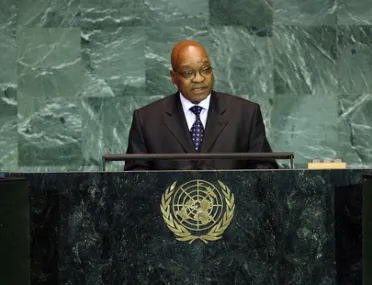Statement
Statement summary
JACOB ZUMA, President of South Africa, said the role of the United Nations in the fight against apartheid had been a unique example of the international community’s exercise of its collective political will. That was why his country was committed to participating in the fight against poverty and numerous world crises. He said it was imperative that all countries acted immediately to stop the global economic crisis from dismantling decades of gains. Despite the negative effects of the economic meltdown, which was severely affecting developing countries, though they had not caused it, eradicating poverty had to be at the heart of the work of the United Nations.
The global economic crisis had made it crucial to reform unrepresentative and outdated Bretton Woods institutions, by making them more democratic and open to the participation of developing countries. In order to eradicate poverty, it was imperative to conclude the Doha Round of trade talks by prioritizing development.
On Africa, he urged the United Nations to ensure that the international community implemented commitments it had made to the continent. The New Partnership for Africa’s Development (NEPAD) must be used to mobilize resources for Africa. There could be no enduring peace without development and thus no development without security. Turning to conflict resolution in Africa, he highlighted his country’s efforts in this regard. Despite the African Union’s political will for conflict resolution, it lacked resources.
He appealed to the United Nations to cooperate with it in its peacemaking efforts and to support the Union’s ban on de facto Governments. He also noted that the quest for global peace and security was inseparable from the pursuit of justice, self-determination, human rights and economic development. In this regard, a peaceful solution to the situation in Western Sahara and the Israeli-Palestinian conflict had to be found immediately.
Turning to the NPT, he stated that the 2010 Review Conference would be an occasion for countries to bind themselves to implementing that accord. It was crucial to strike a balance between disarmament, non-proliferation and peaceful energy use.
Regarding climate change, he stressed that its devastating effects, of which developing countries bore the greatest brunt, would gravely undermine development and poverty eradication efforts. He called for action towards an effective global accord on its challenges, which had to recognize that solving climate change could not be divorced from striving to eradicate poverty. The overall goal would be to decrease worldwide emissions without limiting development in southern countries.
In an ever more interdependent world, only multilateral cooperation could resolve global problems effectively, in which a reformed United Nations had to carry on playing a central role that was effective, transparent and efficient. For that to come into full effect, it was fundamental to reform the Security Council, by making it more representative of the international community, with a permanent African country for instance.
Full statement
Read the full statement, in PDF format.
Photo

Previous sessions
Access the statements from previous sessions.
